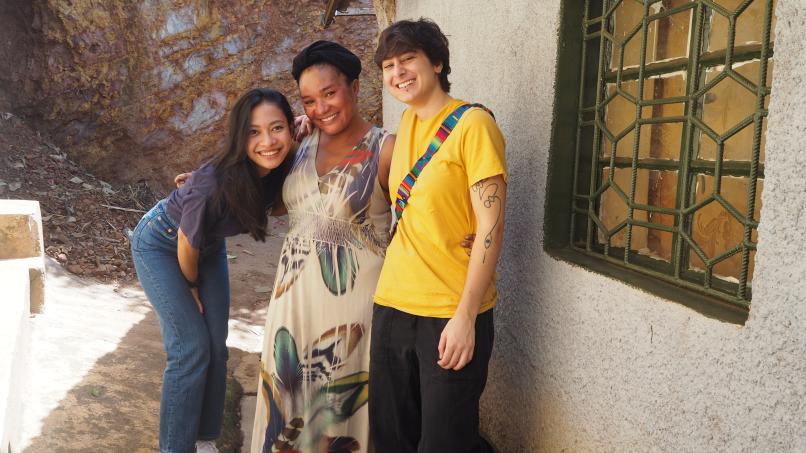Ten days and a thousand hills: Witnessing the transition to electric cooking in Rwanda
By: Arisa Andreani Inagaki & Marina Abagge Greca, Vienna Master of Arts in Applied Human Rights
For Namudu Esther and many other women living in urban households in Kigali, Rwanda, cooking a meal meant time-consuming hours of labour dedicated to collecting wood, making fire, sitting and preparing a meal to present to her family and children. Still, since she participated in the electric cooking pilot in Kigali, Rwanda, a positive shift has been made in what cooking means to her.
‘The benefits (of the electric pressure cooker) are there. It is simple, affordable, and saves time. I can use it while doing other activities…My children can cook while doing their homework at home.’
In urban areas in Rwanda, most households rely on the use of charcoal, which, combined with basic, often inefficient stoves, is among the main contributors to household and air pollution. With traditional culture dictating that women cook for their families, women and often children bear the brunt of the negative health impacts associated with exposure to cooking-induced pollutant emissions the most.
With legitimate motivations, Sustainable Energy for All (SEforALL) and its partners conducted an e-Cooking study to examine the potential for electric pressure cookers (EPCs) to replace the traditional, polluting cooking methods in Rwanda. With the advantages and barriers presented in the report, it became imperative to study the pilot further.
A lack of access to clean cooking solutions and the usage of traditional cooking methods contradicts the advancement of the right to an adequate standard of living. Thus, considering the intersection of clean cooking and human rights (climate change, gender equality, children’s vulnerability and food security), an evaluation project titled Post-Study User Experience Evaluation of the Study E-Cooking Pilot in Kigali, Rwanda was conducted in partnership with SEforALL and the Vienna Master of Arts in Applied Human Rights.
With that, we embarked on a ten-day interview mission trip to Kigali, Rwanda. Field research is an immersive experience that takes you beyond the confines of texts and reports. To be in the heart of communities, where the realities of the project’s successes and challenges are laid bare is a transformative experience. The heart of our mission was to evaluate the development of the e-cooking pilot using a human rights-based approach through the perspectives of different stakeholders, including the local participants of the initial study. With the language barrier presented, the team consisted of six individuals, the project executors and four data collectors who not only speak Kinyarwanda but who are very familiar with the community. So, with that, the six of us commenced a ten-day mission to interview 26 participants around the hilly city of Kigali.
Each day, we drove around the thousand hills of Kigali, visiting two to three households to conduct an hour-long interview each. Going into household after household, as we sat in their living room and conducted interviews, the benefits of the EPCs became more evident with each question asked. It was a stark reminder that every statistic, finding or report is a representation of real human experiences. Witnessing its positive impact first-hand was as impactful as ever and, speaking to the participants, we understood the abundant positive impacts that the EPCs have on their day-to-day lives. One participant mentioned that children would now eat warm meals on time and another mentioned the financial benefits of clean cooking solutions.
‘Before we got the EPC, sometimes the children were sleeping in the evening without getting dinner. They now get a chance to eat warm food, eat on time, saucepans are clean, they don’t spend time going to the market to buy charcoal.’
‘I have been using a lot of charcoal. I can say that using electricity for cooking is less expensive compared to charcoal. The EPC cooks fast. The benefits are so many.’
As we concluded the last interview with the 26 participants, and thus, finishing our field research, we felt deeply connected to the ‘heart of Africa’, Rwanda. Captivated by its kind population, effervescent culture, rolling hills and series of valleys, it proved to be an unforgettable ten days to investigate the human rights impacts of clean cooking solutions on the households in urban Kigali. With such thoughts, it was a transformative expedition that continues to shape our understanding of the vital intersection between clean cooking and human rights.

